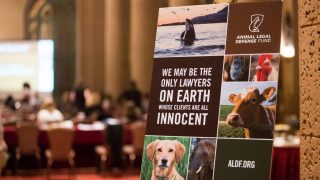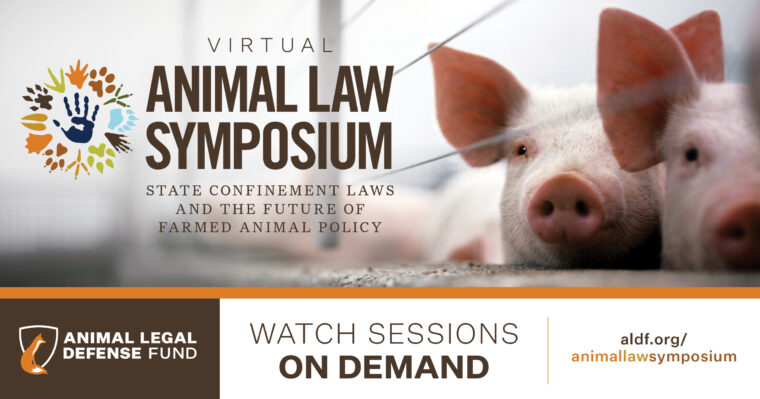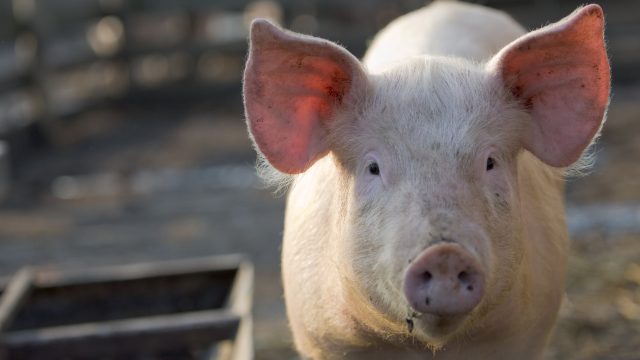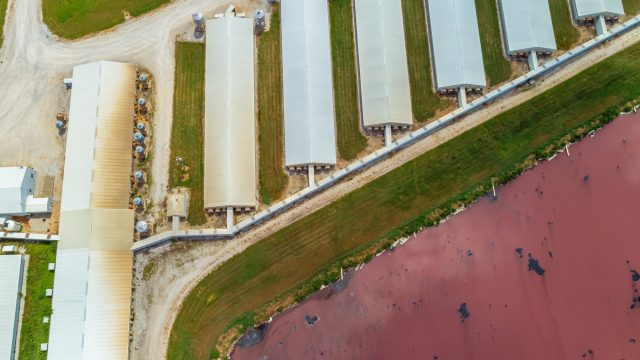

This two-day online event focused on state-level farmed animal protection and policy, with expert panels discussing issues including anti-confinement laws, protecting Proposition 12 and Question 3, defending against the EATS Act, and a look ahead at the future of farmed animal confinement bans and how to protect them.
The Animal Law Symposium: State Confinement Laws and the Future of Farmed Animal Policy was approved for 6 Continuing Legal Education credits by the Florida State Bar Association, and 5 Continuing Legal Education credits by the Oregon State Bar Association. Most states accept credits from other mandatory CLE states such as Florida and Oregon, but please check with your local bar association to confirm. For CLE information please contact events@aldf.org.
Questions? Contact events@aldf.org.
Agenda
Sessions
- Laying the Groundwork for Farmed Animal Protection: State-level Anti-confinement Initiatives
- Protecting State Laws: Litigation to Defend Proposition 12 and Question 3
- Congressional Response: The EATS Act and Other Efforts to Negate State-level Progress for Farmed Animals
- Looking Ahead: The Future of Farmed Animal Confinement Bans and Advocacy Efforts to Protect Them
Sessions
Laying the Groundwork for Farmed Animal Protection: State-level Anti-confinement Initiatives
Friday, 9:00 – 10:15 a.m. PT / 12:00 – 1:15 p.m. ET
Over the past two decades, states have enacted numerous laws and regulations to prohibit the extreme confinement of farmed animals. This has been accomplished by state legislatures, state regulatory agencies, and via ballot initiative. Though the process has been different in each state, these laws and regulations have helped to shift the animal agriculture industry toward a model that reduces both animal suffering and the risk of zoonotic disease transmission. This panel will discuss the current landscape of state-level anti-confinement laws and the processes for passing and protecting those laws, with a special emphasis on how the ballot initiative process can be utilized to protect farmed animals.
This presentation took place on April 5, 2024. Watch the full recording.
Speakers:
Josh Balk
Chief Executive Officer, The Accountability Board
Josh Balk is the co-founder and CEO of The Accountability Board, an organization that utilizes shareholder engagement to advance animal welfare, and other issues with the world’s largest corporations, like McDonald’s, Kroger, Walmart, Burger King and more than a hundred more. Previously, he was the Vice President of Farm Animal Protection at the Humane Society of the United States (HSUS) where he led the passage of a dozen state laws helping egg-laying hens, mother pigs, and/or veal calves, including the historic California Proposition 12. He also led corporate negotiations with the largest food companies to enact animal welfare. Balk is also a co-founder of EAT Just, the maker of Just Egg and the first company to ever sell cultivated meat in the world. Prior to his work at HSUS and co-founding EAT Just, he worked at Animal Outlook where he did undercover investigations at chicken slaughterhouses and factory farms.
Brian Hackett
Director of Government and Community Relations, Associated Humane Societies
Brian Hackett is the Director of Government and Community Relations at Associated Humane Societies (AHS), New Jersey’s largest animal sheltering and protection organization. In this role, Brian is the spokesperson spearheading the progress of animal welfare policy on the state and local level in New Jersey. In addition, he is responsible for building partnerships with community stakeholders as AHS’s animal welfare services are expanded. Prior to joining AHS, Brian worked as a Legislative Affairs Manager at the Animal Legal Defense Fund, successfully advancing projects to elevate the legal status of animals in our society. Included in these victories for animals were landmark laws in New Jersey banning the cruel confinement of mother pigs and veal calves, and a cost of animal care law to better provide for the care of animals lawfully seized from neglect and cruelty situations. Further, Brian helped pass the New York Puppy Mill Pipeline Ban law to support shelter and rescue pets, by stopping the retail sale of cats, dogs, and rabbits from commercial breeding mills.Before his tenure at the Animal Legal Defense Fund, Brian served as the New Jersey state director for the Humane Society of the United States. In that role, he engaged in all levels of government, placing an emphasis on effective collaboration with various stakeholders to advance animal protection policies. He directly led or played a critical role in passing over a dozen new animal protection laws statewide, including ending circus animal cruelty, banning the shark fin sales trade, restructuring humane law enforcement, and cutting off state markets to animal trophies.
On the local level, Brian worked to advance the most local anti-puppy mill measures of any state, with 140 municipalities and nine counties recognizing the puppy mill problem. He has assisted efforts for humane community cat management through Trap-Neuter-Vaccinate-Return (TNVR) policies with various counties and municipalities. He also is a board member for People for Animals, a NJ-based network of low-cost spay/neuter and wellness clinics.
Hackett is magna cum laude graduate of The College of New Jersey, graduating with a bachelor’s degree in political science and public policy management. He also once served as a local town council member and is the proud pet parent of two shelter dogs and many rescued cats.
Stephanie Harris
Senior Legislative Affairs Manager, Animal Legal Defense Fund
As Senior Legislative Affairs Manager, Stephanie works to develop and advance Animal Legal Defense Fund’s legislative campaigns. After nearly a decade in animal protection, Stephanie Harris has extensive experience in lobbying, strategy development, coalition building, and volunteer management.Previously, Stephanie was the Senior State Director for Massachusetts and Rhode Island at the Humane Society of the United States, where she was instrumental in helping pass state and municipal animal protection laws. She was the Campaign Director for the 2016 Massachusetts farmed animal protection ballot campaign to phase out cruel confinement of farmed animals and the sale of products (eggs, pork, and veal) coming from such confinement. Voters approved the initiative with 78% support and created the strongest farmed animal protection law in the world at the time. Earlier in her career, Stephanie worked on wildlife protection ballot campaigns in Michigan and Maine, and on various farmed animal protection state legislative campaigns. She also interned at a wildlife rescue and rehabilitation facility after graduating from Franklin & Marshall College, where she studied political science and studio art.
Moderator: Chris Green
Executive Director, Animal Legal Defense Fund
Chris Green is the Animal Legal Defense Fund’s executive director, assuming the role in September 2023. He rejoins the Animal Legal Defense Fund having established the organization’s Legislative Affairs Program and served as its director from 2013–2015. For the past eight years, Chris has been the inaugural executive director of the Brooks McCormick Jr. Animal Law & Policy Program at Harvard Law School — where he helped launch the Harvard Animal Law & Policy Clinic and grew the Program from an initial staff of three to now having over 30 faculty, staff, lecturers, scholars, researchers, and fellows.During his animal law career, Chris has helped defeat Ag-Gag legislation in several states, helped pass and defend farmed animal protection ballot measures, directed efforts that led SeaWorld San Diego to halt the breeding and import of new orcas, served on a National Academies committee that caused the U.S. Dept. of Veterans Affairs to stop using dogs in biomedical research, and persuaded the top three U.S. airlines to cease transporting African hunting trophies. After a conference in China, Chris also rescued Lily, a terrified Samoyed dog who was about to be slaughtered for food at a back-alley butcher stand.
Chris helped inaugurate the American Bar Association’s TIPS Animal Law Committee in 2005 and served as its chair in 2015. In that capacity he successfully enacted ABA-wide policy resolutions recommending that all U.S. legislative bodies outlaw the possession of dangerous wild animals and provide police officers with non-lethal animal encounter training. In 2022, the American Bar Association honored Chris with its award for “Excellence in the Advancement of Animal Law.”
Chris’ own academic scholarship has been published in the Animal Law Review, and he has consulted on animal legal issues with dozens of major media outlets.
Chris is a graduate of Harvard Law School, where he took the school’s first course in Animal Law, and the University of Illinois, where he created the school’s first Environmental Science degree. He also spent several decades working in the fine arts, film, and music industries — producing documentaries that include Of Dogs and Men, a film about police shooting people’s companion animals.
Resources:
Protecting State Laws: Litigation to Defend Proposition 12 and Question 3
Friday, 10:30 – 11:45 a.m. PT / 1:30 – 2:45 p.m. ET
California’s Proposition 12, which prohibits the raising of and sale of products from mother pigs, chickens used in egg production, and calves raised for veal in extreme confinement, has been the subject of litigation, rising all the way to the Supreme Court of the United States. In May 2023, the Supreme Court ruled that Proposition 12 was constitutional, validating the law and setting precedent for others like it. Massachusetts’ Question 3, a similar law, is currently being challenged. This panel explores the legal challenges, constitutional considerations, and litigation strategy employed by those defending state anti-confinement laws.
This presentation took place on April 5, 2024. Watch the full recording.
Speakers:
Scott Ballenger
Assistant Professor of Law, University of Virginia School of Law
Scott Ballenger is director of the Appellate Litigation Clinic. After graduating from the Law School in 1996 he served as a law clerk for Judge J. Clifford Wallace of the Ninth U.S. Circuit Court of Appeals and for Justice Antonin Scalia. He also served as senior counsel to the assistant attorney general in the antitrust division of the Department of Justice, where he worked on the trial and briefing team for United States v. Microsoft. After leaving the DOJ, Ballenger joined Latham & Watkins in Washington, D.C., where he spent 20 years as an associate and then a partner in the firm’s Supreme Court and appellate practice. Scott has represented the Humane Society of the United States for many years, in cases involving depictions of animal cruelty (United States v. Stevens), preemption (National Meat Association v. Harris) and the ability of states to prohibit the sale of the products of cruelty such as foie gras, shark fins and eggs from hens confined in battery cages.
Rebecca Cary
Senior Staff Attorney, The Humane Society of the United States
Rebecca Cary is Special Counsel for the Animal Protection Law section of The Humane Society of the United States, where she has worked since 2010. Her practice includes farm animal welfare and constitutional defense issues, and she has been the lead attorney on multiple challenges to state farm animal confinement and sales initiatives, including the National Pork Producers Council v. Ross case in which the Supreme Court upheld California’s Proposition 12 in 2023. Rebecca is a 2009 graduate of Northeastern University School of Law, and a 2005 graduate of the University of California San Diego, where she was a founding member of a student animal welfare group. She currently co-chairs the District of Columbia Bar’s Animal Law section and is also an adjunct faculty at George Washington University and George Mason University, where she co-teaches animal law courses. She lives in Maryland with her three rescue cats, and a visiting squirrel.
Kelsey Eberly
Senior Attorney, FarmSTAND
Kelsey Eberly is a Senior Staff Attorney at FarmSTAND, where she engages in strategic litigation and advocacy to fight for transparency and accountability in the industrial animal agriculture industry. Before that, Eberly was Clinical Lecturer and Abrams Fellow in the Media Freedom & Information Access Clinic at Yale Law School, where she supervised students in litigation and advocacy to increase government transparency and defend the essential work of news gatherers. Prior to joining the Clinic, Kelsey was a Legislative Policy Fellow at the Brooks McCormick, Jr. Animal Law & Policy Program at Harvard Law School, and an attorney with the Animal Legal Defense Fund. Eberly graduated from the University of California Los Angeles School of Law and, before training to become a lawyer, worked as an editor for press and media organizations in the San Francisco Bay Area.
Ashton MacFarlane
Brooks Institute Emerging Scholars Fellow, Harvard Law School
Ashton Macfarlane is a PhD candidate in the History of Science at Harvard University. He received his JD from Harvard Law School, where he was a Brooks Institute Emerging Scholars Fellow and a Notes Editor on the Harvard Law Review. His academic interests are at the intersection of animal and environmental law, and he has also written on administrative remedies and the history of global environmental monitoring. Past projects include the history of phenology—or the study of biological time—and its use as a climate change indicator in the twentieth century. Current projects include the history of the United States Clean Air Act, federal courts’ common law procedural powers, and the management of solar development to protect threatened animal species in the American West. Ashton has additionally worked on legal briefs in litigation surrounding the EPA’s Clean Power Plan and, more recently, California’s Proposition 12. His writing has appeared in the Harvard Law Review and in environmental history and the history of science journals. He received his undergraduate degree from Harvard in Biology and the History of Science and spent a year before law school on a fellowship in New Zealand. Ashton also has served as a Clinic Research Assistant for the Harvard Animal Law & Policy Clinic.
Moderator: Amanda Howell
Managing Attorney, Animal Legal Defense Fund
As a managing attorney for the Animal Legal Defense Fund, Amanda Howell uses her background in strategic impact litigation to help us win big for animals. Prior to joining the Animal Legal Defense Fund, Amanda’s career was focused on improving the food system and curbing the harmful practices of multinational corporations. She is dedicated to using her skills to combat iniquity and believes that changing how we view and treat animals will simultaneously improve life for all sentient beings and positively impact individual health, public health, and our environment.
Amanda graduated from Northwestern University with a triple major in Political Science, International Studies, and Spanish. She received her law degree from Boston University, where she was the managing editor for the American Journal of Law and Medicine.
Resources:
Congressional Response: The EATS Act and Other Efforts to Negate State-level Progress for Farmed Animals
Saturday, 9:00 – 10:30 a.m. PT / 12:00 – 1:30 p.m. ET
Litigation isn’t the only threat to state-level anti-confinement laws. Legislation designed to preempt and invalidate these laws has been introduced in several Congresses, culminating in the most recent, “Ending Agricultural Trade Suppression (EATS) Act,” which could nullify hundreds of state-level agriculture laws. This panel discusses the EATS Act, how it could jeopardize laws like California’s Proposition 12, how the Farm Bill factors in, and the history of this legislation.
This presentation took place on April 6, 2024. Watch the full recording.
Speakers:
Ann Linder
Associate Director of Policy & Research, Harvard Law School
Ann Linder is Associate Director of Policy & Research and Wildlife and Live Animal Markets Fellow with the Brooks McCormick Jr. Animal Law & Policy Program at Harvard Law School. She also teaches “Animal Law” to graduate students at Tufts University. Much of her work focuses on the intersection of animal law and public health. Prior to Harvard, she worked as a wildlife policy analyst for the Cummings School of Veterinary Medicine at Tufts University focusing on applications of immunocontraceptive vaccines in free-roaming horses and cervids. She also spent time working with the Animal Protection Unit for the City of Austin, Texas after serving as a Legislative Policy Fellow for the Harvard Animal Law & Policy Program in 2018. Her work on zoonotic disease threats posed by animal industries has been published in Science and has been featured in the New York Times, U.S.A. Today, and other media outlets. She received her JD from Stanford Law School and holds a Master of Science in Animals and Public Policy from Tufts University.
Kelley McGill
Legislative Policy Fellow with the Brooks McCormick Jr. Animal Law & Policy Program, Harvard Law School
Kelley McGill is a legislative policy fellow with the Brooks McCormick Jr. Animal Law & Policy Program (ALPP) at Harvard Law School. She authored the EATS Act report published by ALPP in 2023. Kelley has a background in agricultural law, food policy, and legislative drafting. She holds a JD cum laude from Harvard Law School.
Ann Sherman
Solicitor General, Michigan Department of the Attorney General
Ann Sherman is the Solicitor General for the State of Michigan, coordinating all appeals for Michigan Department of Attorney General and practicing in the United States Supreme Court, the Sixth Circuit and D.C. Courts of Appeal, and Michigan’s appellate courts. She is a graduate of Michigan State University College of Law and holds master’s degrees in music from the University of South Florida and Northwestern University. Prior to her career at the Michigan Department of Attorney General, Ann clerked for the Honorable Richard F. Suhrheinrich at the U.S. Court of Appeals for the Sixth Circuit. She was appointed Solicitor General in December of 2022, having previously served the Department as Deputy Solicitor General, Assistant Solicitor General, and an appellate specialist in one of the Department’s busiest litigation divisions, during which time she has received the Department’s top civil litigator award, numerous appellate advocacy awards, and several desk awards for success in major cases before the Michigan Supreme Court. In 2021 the National Association of Attorneys General awarded her its prestigious Meritorious Service Award for her service to the Nation and the State of Michigan.
Alicia Prygoski
Strategic Legislative Affairs Manager, Animal Legal Defense Fund
As Strategic Legislative Affairs Manager, Alicia Prygoski works to develop and advance the Animal Legal Defense Fund’s legislative campaigns at the local, state, and federal levels.
Before joining the Animal Legal Defense Fund, Alicia worked as a public policy coordinator for farmed animal protection at the Humane Society of the United States and as a policy associate at the Animal Welfare Institute. At both organizations she worked to enhance legal protections for farmed animals across the country and contributed to passing a ballot initiative in Massachusetts and legislation in Rhode Island banning the extreme confinement of animals in factory farming operations.
Alicia has a Bachelor of Arts in Environmental Policy from the University of Michigan and a law degree from Western Michigan University-Cooley where she founded and ran the school’s Animal Legal Defense Fund student chapter. In 2016 she received the Wanda A. Nash Award from the State Bar of Michigan Animal Law Section for advancing animal law in the state.
Moderator: Chris Green
Executive Director, Animal Legal Defense Fund
Chris Green is the Animal Legal Defense Fund’s executive director, assuming the role in September 2023. He rejoins the Animal Legal Defense Fund having established the organization’s Legislative Affairs Program and served as its director from 2013–2015. For the past eight years, Chris has been the inaugural executive director of the Brooks McCormick Jr. Animal Law & Policy Program at Harvard Law School — where he helped launch the Harvard Animal Law & Policy Clinic and grew the Program from an initial staff of three to now having over 30 faculty, staff, lecturers, scholars, researchers, and fellows.
During his animal law career, Chris has helped defeat Ag-Gag legislation in several states, helped pass and defend farmed animal protection ballot measures, directed efforts that led SeaWorld San Diego to halt the breeding and import of new orcas, served on a National Academies committee that caused the U.S. Dept. of Veterans Affairs to stop using dogs in biomedical research, and persuaded the top three U.S. airlines to cease transporting African hunting trophies. After a conference in China, Chris also rescued Lily, a terrified Samoyed dog who was about to be slaughtered for food at a back-alley butcher stand, and she now lives with his parents in Illinois.
Chris helped inaugurate the American Bar Association’s TIPS Animal Law Committee in 2005 and served as its chair in 2015. In that capacity he successfully enacted ABA-wide policy resolutions recommending that all U.S. legislative bodies outlaw the possession of dangerous wild animals and provide police officers with non-lethal animal encounter training. In 2022, the American Bar Association honored Chris with its award for “Excellence in the Advancement of Animal Law.”
Chris’ own academic scholarship has been published in the Animal Law Review, and he has consulted on animal legal issues with dozens of major media outlets.
Chris is a graduate of Harvard Law School, where he took the school’s first course in Animal Law, and the University of Illinois, where he created the school’s first Environmental Science degree. He also spent several decades working in the fine arts, film, and music industries — producing documentaries that include Of Dogs and Men, a film about police shooting people’s companion animals.
Resources:
Looking Ahead: The Future of Farmed Animal Confinement Bans and Advocacy Efforts to Protect Them
Saturday, 10:45 – 12:00 a.m. PT / 1:45 – 3:00 p.m. ET
There is significant momentum for state-level bans on extreme confinement of farmed animals, and states continue to introduce and pass these laws. At the same time, litigation and legislative efforts to invalidate them continue as well. This panel examines the future of farmed animal confinement bans at the state level, what experts anticipate at the federal level with the current Farm Bill process underway, and the role that advocates can play in protecting and advancing state and local laws to protect farmed animals.
This presentation took place on April 6, 2024. Watch the full recording.
Speakers:
Alexandra Bookis
Senior Manager of U.S. Government Affairs, Farm Sanctuary
Alexandra Bookis (she/her) is Senior Manager of U.S. Government Affairs at Farm Sanctuary, where she works to build better food systems for animals, people, and the planet through federal reform. Her background includes seven years of experience across municipal food and public health policy, animal advocacy with national nonprofit organizations, and academic research in food systems and social psychology. Alexandra’s policy work has been featured in outlets like The Hill, and she has spoken at Congressional briefings and academic programs. She holds an M.A. in Animal Studies from New York University and an Honors B.S. in Psychology and French from Tulane University. A ballet dancer with professional experience, Alexandra continues to dance in Washington, D.C., and she also enjoys plant-based cooking and hiking with her rescue dog.
Matt Rossell
Campaigns Manager, Animal Legal Defense Fund
As Campaigns Manager, Matt Rossell inspires and engages supporters to participate in Animal Legal Defense Fund’s work and increase success throughout the organization.
For decades, Matt has dedicated his life to animal protection, serving as Campaigns Director for Beagle Freedom Project and Animal Defenders International, and as the Northwest Director of In Defense of Animals. His leadership has led to many successes and advances in local, state, and federal legislation and grassroots advocacy. Matt started as an undercover animal abuse investigator, and those profound early experiences and the animals he met continue to inspire him today.
Gabriel Wildgen
Director of Public Policy, The Humane League
Gabriel Wildgen is the Director of Public Policy for The Humane League (THL). Prior to THL, he represented the Good Food Institute on Capitol Hill, where he helped secure the first-ever Congressional appropriation for alternative protein research. As a Policy Fellow at the Harvard Animal Law & Policy Program, along with his co-Fellow and THL Board Member Alicia Rodriguez, Gabriel helped lay the foundation for what has now become The Humane League’s Animal Policy Alliance (APA), a national network of local and state level policy organizations uniting to end large-scale animal cruelty through policy change. Gabriel began his work in animal advocacy as a campaign manager at Humane Society International/Canada, where he successfully coordinated coalitions and lobbied at all levels of government in Canada to secure wildlife protection legislation and collaborated with public institutions and major food service companies to reduce animal product consumption. Gabriel holds a J.D. from Harvard Law School and a Bachelor of Journalism from Carleton University.
Moderator: Kathleen Schatzmann
Strategic Legislative Affairs Manager, Animal Legal Defense Fund
Kathleen is the Animal Legal Defense Fund’s Strategic Legislative Affairs Manager. Kathleen has been a successful leader in animal protection with over 15 years of government affairs and public policy experience. She has successfully managed numerous animal protection initiatives, working in cross-functional roles to create innovative practices to overcome campaign objectives and challenges.
Before joining the Animal Legal Defense Fund, Kathleen worked as NJ Senior State Director for the Humane Society of the United States where she worked to strengthen animal protection laws on the local, state, and federal level. She has established strong relationships with policy makers and influencers which led to the passage of numerous animal protection laws – including the nation’s first ivory ban. Kathleen continues to collaborate with the animal protection community to work in a unified fashion.
Her previous achievements include serving on the Governor appointed NJ Animal Welfare Task Force, as Board Member for the NJ Animal Welfare Federation, Board Member for the Monmouth County SPCA, Board Member for People for Animals, chair of the New Jersey-based Protecting Animal Welfare PAC, and advisor to NJ Voters For Animals.
Resources:
Focus Area
How We Work
Related
-
Court Rules Texas Food Label Censorship Law is Unconstitutional
The law imposed unclear and vague standards on plant-based meat producers that violate the First AmendmentJanuary 29, 2026 Press Release -
State Animal Protection Laws Ranked: Oregon is #1, North Dakota #50
20th edition of ALDF state and territory ranking report highlights major advancements & trends in animal protection across the U.S.January 27, 2026 News -
Over 30 Organizations Urge USDA to Limit Federal Support for Manure Digesters
Hundreds of millions of dollars intended to cut energy costs have been funneled to costly manure digesters, benefitting the largest factory farmsJanuary 15, 2026 News



